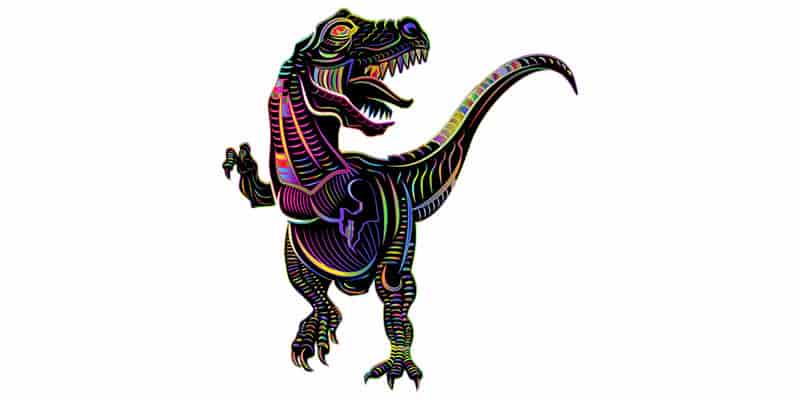Dinosaur adventures in Dungeons and Dragons 5e and other tabletop RPGs can be a fun escape from the ordinary fantasy adventure. Sure, dragons are a long-time staple in the genre, but other humungous reptiles need time in the spotlight, too. Lost worlds, pristine wilderness and unknown ecologies can turn a quest into a unique experience.
To build a dinosaur adventure in DnD 5e, consider the following elements:
- Warm climate settings-jungles, deserts
- Pitfalls come from an unknown environment
- Character tropes: scientist, adventurer
- Questing: Dinosaur hunt or gathering quest
- The Hollow Earth scenario
- Land Out of Time scenario
It’s like Jurassic Park… with magic.
Warm climate settings-jungles, deserts
Consider a warm climate for these adventures—something like a desert, swamp or jungle. Your reptilian inhabitants are gonna need that extra heat. Plus, we want to jump out of the cloudy, dreary medieval setting we typically get with fantasy role playing games.
Jungle Setting
Jungles stick out in my mind when it comes to dinosaur adventures. In fact, most of my references for dinosaur stories include a jungle setting. Think about The Lost World, Jurassic Park, even Journey to the Center of the Earth. Dinosaurs inside jungles just makes sense.
Broad-leafed plants, strange flowers, horrifyingly large insects and towering canopies should paint your jungle setting. Also, smaller dinosaurs, fish and amphibians can offer interesting finds for your party that aren’t entirely lethal.
However, check out these environmental hazards inside the jungle:
- Carnivorous pack hunters underneath the dark canopy.
- An explorable canopy with branches large enough to walk, complete with flying dinosaurs and prehistoric birds/bugs.
- Quicksand and hidden bogs
- Poisonous bugs/plants
- Fungal phenomenon and creatures on the jungle floor.
- Volcanic activity—lava pools and rivers.
Desert Setting
Desert dinosaur settings can pull from the American West—rocky plateaus, salt lakes and flat, arid landscapes. Water will be an important resource to keep up with. Plus, exploring cavernous formations of sandstone can give the environment structure to move through. That is, as opposed to a vast, sandy expanse via the Sahara Desert.
Some desert environmental hazards include:
- Lack of water, food.
- Climbing and rock hopping.
- Hostile ecology—sharp cacti, venomous scorpions.
- An oasis that harbors local apex predators.
- Cave systems that hold who-knows-what inside to escape the sun.
Pitfalls come from an unknown environment
To further expand on how pitfalls occur in dinosaur adventures, we should put ourselves in our adventurers’ shoes.
These explorers are questing through an unknown ecology. Every flower could be poisonous—even carnivorous. The bugs and fungi are oversized and aggressive. In fact, everything in a primal world is going to be oversized and aggressive. The beauty of this is that it opens exploration to much more than monster encounters and possible dungeons.
Now, we can have characters who simply want to explore their surroundings before launching on a mission to collect loot. Maybe loot isn’t even a part of the equation. Perhaps the party simply needs to find food and water for survival. Therefore, quests could be set up to find new sources of food, healing implements or even behavioral data from the strange dinosaurs inhabiting the land.
Character tropes: scientist, adventurer
Though magic will be a unique element in this Lost World adventure, we can still pull inspiration from dinosaur-themed stories for interesting characters. Let’s shake up the traditional character archetypes and make it a little more sci fi. We’ll start with two archetypes for your consideration: the scientist and the adventurer.
The Scientist
An explorer and expert in environmental sciences. The scientist may be the leader of a party of mercenaries, hunters or adventurers hired for protection. This character could be a driving force for the exploration of a rare, primitive land. On the other hand, a scientist may be a hired hand for a particular expertise. Consider these classes:
- Wizard: A character whose magic runs on Intelligence, the wizard will have innate abilities to investigate with Nature, History, Arcana and Religion checks. Schools like transmutation, evocation, scribe or even necromancy could bring interesting scientist vibes.
- Artificer: Naturally, the tinkering artificer would be a great fit as a scientist. Most likely, this would look like an artificer alchemist, but any subclass works.
- Druid: Of course, druids are more often on the Wisdom side of things, their connection to the environment can also lend to a scientist trope. Circle of the Land and Circle of Spores come to mind as good examples.
The Adventurer
The adventurer is a hired hand to help navigate, hunt dinosaurs or protect the party. Otherwise known as the mercenary, this trope is typical to adventure stories. However, we can give our adventurer a swashbuckling, lovable scoundrel personality.
- Ranger: Obviously, a ranger fits the dinosaur hunter theme. However, rangers are also notable navigators and investigators with high Perception and Survival abilities. Consider a ranger Hunter or Beastmaster (especially for dinosaur pets).
- Artificer: Again, artificers fit this trope as gunslinging tinkerers. Consider an artificer artillerist or armorer to bring the mercenary side of the class to life.
- Druid: Circle of the Moon druids can focus on shapeshifting (perhaps even into an allosaurus), acting as primal trackers and defenders.
- Rogue: Perhaps a thief character knows of a lost temple deep in the jungles of a lost island. A high Dexterity score will keep me quick on my feet against pitfalls and predatory ambushes. Plus, a rogue can really lean into the scoundrel side of adventure.
Questing: Dinosaur hunt or gathering quest
Questing in a land of dinosaurs offers unique jungle, marsh or desert adventures with primal goals. As I’ve already mentioned, gathering supplies need for survival can generate an endless amount of quests. Plus, hunting a dangerous predator may be a necessity to stay alive. Consider the following quest setups—perhaps you can launch a campaign off one of these.
- Dinosaur Hunt: The party has been hired as bounty hunters to seek and destroy an invading predator from a local jungle. Perhaps a small village of explorers and researchers have made camp in a strange land. The dinosaur hunters keep the threats culled.
- Gathering Quests: A new environment holds new treasures. Consider magical components of prehistoric herbs, fungi and natural ingredients. A rare flower could hold a cure to a newfound venom, but the party must climb a volcanic mountain to find where they grow.
- Lost Temples: A somewhat Lovecraftian idea, the party could encounter the ruins of a prehistoric civilization of lizard folk or amphibious race. However, the wrong move could awaken an evil older than time.
The Hollow Earth scenario
One way to bring your party into this strange environment is to pull from Journey to the Center of the Earth (or more recently, Godzilla vs Kong).
That’s right, take it underground.
Guide to Building Forest Adventures and Encounters: DnD 5e
| Guide to Building Pirate Characters: DnD 5e
|
This world can be lava-filled—maybe alight by crystal energy and glowing hot lava. On the other hand, it could just be a portal to another dimension. However, I like the idea of traveling through darkness into another world. Plus, an easy way to launch this kind of adventure is through a typical dungeon, cave or other subterranean quest.
Land Out of Time scenario
Similarly, we can play with classic sci fi in the Lost World or Land of the Lost. Somewhere along the line, the party may have slipped into a time vortex. Maybe a foggy island is surrounded by a strange quantum time magic that preserves a primitive ecology. We can even pull from the “mad scientist gets it right” trope if one of your players is in the mood. Perhaps a wizard or mad artificer?
To Wrap It Up
Think ecosystem. Dinosaur worlds are vibrant—full of exotic life that’s alien to the everyday. In the real world, it’s kind of crazy that these gigantic bird lizards—real life dragons—actually existed. Pull from that feeling. It’s kind of like Sam Neil seeing the dinosaurs in Jurassic Park for the first time—you know what I mean.



